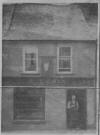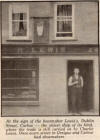Shoe-maker
Charlie still sticking to his last...
By Charlie Keegan
Charlie Lewis can remember the time when
there was a dozen shoe-makers in Carlow town. Today, this old
and proud craft has declined to such a degree that Charlie's
shop at 24 Dublin Street is the town's last shoe making
business.
A third generation shoe-maker, Charlie is a
member of an old Carlow family — he traced the family ancestry
to 1815 through the baptismal registry at St. Mary's Church.
The Lewis business was established in 1857
by Robert Lewis Charlie's grandfather. He carried on a
shoe-making concern at Potato Market before moving to Dublin
Street.
-

- Shoe-maker Charlie Lewis at work on the
stitching machine in his Dublin Street,
Carlow, shop which has been a family concern
since the middle of the last century.
- Photo: Courtesy of The Irish Times.
|
Eleven when father died
Charlie attended the Church of Ireland
school in Barrack Street (where the IT&GWU headquarters are
today) and was only 11 when his father, also Charles, died in
1930. His mother, Elizabeth (formerly a member of the Whittaker
family from Old Leighlin who subsequently lived in
Graiguecullen) was keen that he would carry on the shoe-making
trade into the third generation.
"I went to school for four years after my
father died," he says, "and, at the beginning, I was not totally
committed to being a shoemaker. But I got to like the trade and
am now totally happy at my work."
Charlie learned his trade from a shoe-maker
who had worked with his father and continued on after Mr. Lewis
senior's death. His name was Maurice Moloney and he was a native
of County Kerry.
Charlie recalls that his father did a good
trade in making shoes. He made hunting boots which involved very
intricate work and was very time-consuming.
"He used to cut out his own uppers but I
never did — I bought the uppers."
Jobs such as the making of hunting boots
would be done strictly to order and would cost the client about
£20, the equivalent of over £200 today.
Charlie Lewis regards shoe-making as a way
of life rather than a way of making a living.
"People are always coming in and out of the
shop for a chat," he says. "Some sit down and wait while I do
their shoes. There is a nice, homely atmosphere and you get to
know a lot of people. Apart from being customers, these people
have become my friends."
War time rationing
The business thrived to such an extent that
in the late 1930’s there three men working in the shoe-maker’s
shop. But then came the war years when leather was rationed and
raw materials hard to come by. Vital small tools of the trade
such as rivets, tindles and hemp were hard to get.
When he was serving his time to the trade
Charlie had to make a complete shoe. He did the work piecemeal,
going back to it between the repair work which was the central
core of the business.
What he made was a welted shoe which
involved a leather rim being put on the upper to which the sole
was attached. This was hand-stitched and involved very intricate
work.
With the slip sole shoe the upper was
either tacked or braced in.
"The last pair of shoes I made, about two
years ago, I used the bracing method."
Charlie often burns the midnight oil, and
has done all his life. The work was slow and painstaking.
Pointing to five rows of shoes, Charlie
told me he could pick out the shoes of any customer who called.
"I put the name on the shoes when they come
in for repair but, after repairing them, I know them without
looking at the name."
Charlie recalls that Governey's Boot
Factory in Carlow manufactured great shoes — sturdy,
long-lasting shoes and "the wear was in them."
In the old days shoes could be bought for
15 shillings (75 new pence) and 23 shillings for "a really good
pair."
"As far as I can recall it was a half-crown
(12½ pence) for putting soles and heels on ladies shoes and six
shillings for men’s."
Charlie's brother Robert (now deceased)
worked in the business at one stage but never liked it and
became a plumber. And Charlie's own son, Robert, also did not
take to the trade.
Nowadays, shoes can be stuck on the spot
but Charlie Lewis says that in his younger days it was "a
novelty" to see a tin of solution.
Years ago all the shoes were stitched. Then
came the switch away from leather to rubber and plastic. Charlie
had to adjust to these changes.
"I was used to leather and found it strange
working with rubber," he says. He had "a terrible time" getting
used to plastic.
-

- The late Charles Lewis pictured in 1920
outside the shoe-maker's shop in Dublin Street,
Carlow, established by his father, Robert Lewis.
|
-

- At the sign of the bootmaker Lewis's, Dublin
Street, Carlow - the oldest shop of its kind,
where the trade is still carried on by Charlie
Lewis. Once every street in Graigue and Carlow
had a shoemakers shop.
Source: The Nationalist Centenary
Supplement 1883-1983 |
£300 would buy a house
Charlie bought a finishing machine in 1964
which still serves him well while he works on a German-made
stitching machine. The finishing machine cost him £300 -at-the
time but in ‘64 that kind of money would buy a house."
If he was to live his life all over again
would he still choose shoe-making?
“I always had an inclination towards office
work,” he says. “But my mother felt that by staying here in the
business I would be a help to her and it would be keeping the
shoe-making tradition going. The business was maintained and
that was important to me.”
Charlie Lewis says at the moment he is not
ready for retirement but today he “chooses his work.”
“As I see it, I am fit to work and am happy
to be working,” says this cheerful and skilled craftsman, whose
little shop is one of the last reminders of the Carlow of
yesterday.
Source: The Nationalist Sept 30th 1988 from
the Nolan collection of newspaper cuttings provided by Michael Purcell..
Please
report any images or links which do not open to
mjbrennan30@gmail.com
- The information contained
in these pages is provided solely for the purpose of sharing
with others researching their ancestors in Ireland.
- © 2001 Ireland Genealogy Projects,
IGP TM By
Pre-emptive Copyright - All rights reserved
Back to the top